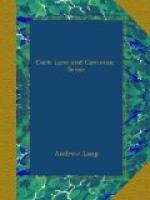Wodrow does not appear to have witnessed the execution at Paisley, one of the last in Scotland, but he had no doubt that witches should be put to death. In 1720, when the son of Lord Torphichen exhibited some curious phenomena, exaggerated by report into clairvoyance and flying in the air, nobody was punished. In spite of his superstition in regard to witches, Wodrow (September 20, 1697) sensibly explains a death-wraith by the anxiety of the lady who beheld it. He also, still in the diary, records a case of second sight, but that occurred in Argyleshire. It will be found, in fact, that all the second-sighted people except some ministers during the sufferings (and they reckoned as prophets) were Highlanders. Considering his avidity for ghost-stories, it is remarkable that he scarcely ever receives them at even second hand, and that most of them are remote in point of time. On the other side, he secures a few religious visions, as of shining lights comforting devout ladies, from the person concerned. His narratives fall into regular categories, Haunted Houses, Ghosts, Wraiths, Second Sight, Consolatory Divine Visions. Thus Mr. Stewart’s uncle, Harry, ’ane eminent Christian, and very joviall,’ at a drinking party saw himself in bed, and his coffin at his bed-foot. This may be explained as a case of ‘the horrors,’ a malady incident to the jovial. He died in a week, In vino veritas.
Lord Middleton’s ghost-story Wodrow got from the son of a man who, as Lauderdale’s chaplain, heard Middleton tell it at dinner. He had made a covenant with the Laird of Babigni that the first who died should appear to the survivor. Babigni was slain in battle, Middleton was put in the Tower, where Babigni appeared to him, sat with him for an hour by the clock, and predicted the Restoration. ‘His hand was hote and soft,’ but Middleton, brave in the field, was much alarmed. He had probably drunk a good deal in the Tower. This anecdote was very widely rumoured. Aubrey publishes a version of it in his Miscellanies, and Law gives another in his Memorialls (p. 162). He calls ‘Babigni’—’Barbigno,’ and ‘Balbegno’. According to Law, it was not the laird’s ghost that appeared, but ’the devil in his lykness’. Law and Aubrey make the spirit depart after uttering a couplet, which they quote variously.




